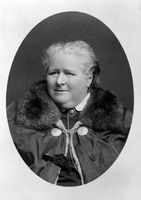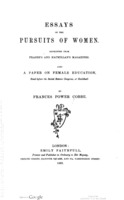Cobbe's "Celibacy v. Marriage," Fraser's Magazine (1862, reprinted as "Essay II" in Essays of the Pursuits of Women 1863)
Dublin Core
Title
Cobbe's "Celibacy v. Marriage," Fraser's Magazine (1862, reprinted as "Essay II" in Essays of the Pursuits of Women 1863)
Subject
Marriage
Gender Norms
Friendship
Relationships--Intimate--Opposite-sex
Relationships-- Intimate--Same-sex
Religion
England
Criticism
Description
The essay gives reasons for both sexes to refrain from marrying, among which gendered violence can be found. Although marriage remains the ideal, a "love and union conjugal nobler and more tender" (56), the contexts of new laws by Divorce Court and the present gender inequality in marriage cause an increase in divorce numbers as well as a rising number of men and women choosing not to marry. The esseay envisions a new ideal ideal of marriage for the "Englishwoman of the twentieth century" (56).
The excerpts given here illustrate Cobbe's notion of respectable single women, so-called 'old-maids,' and all-female living arrangements within the dynamic marriage discourse.
Credit
Creator
Cobbe, Frances Power, 1822-1904
Source
"Celibacy v. Marriage." in: Essays of the Pursuits of Women, Emily Faithfull, 1863, pp.38-57.
Publisher
Emily Faithfull
Date
1862-00-00
Type
Reference
Article Item Type Metadata
Text
Excerpts
[page 50]
"In the first place, till lately the condition of an un married woman of the upper classes was so shackled by social prejudices that it was inevitably a dreary and monotonous one. Mostly, the 'old maid' lived in a small house or lodging, out of which she rarely dared to sally on any journey, and where, with a few female friends as closely limited as herself, she divided her life, as the Frenchman has it, between 'la médisance, le jeu, et la dévotion.' A society of these un happy ones was once not inappropriately nicknamed by a witty nobleman 'the Bottled Wasps.' It is half piteous, half ridiculous, to hear of the trifles which occupy these poor shrivelled hearts and minds. We once called on a very worthy and even clever member of the sisterhood residing in Bath. Her features were discomposed —her voice somewhat shriller than usual."
[page 50]
"In the first place, till lately the condition of an un married woman of the upper classes was so shackled by social prejudices that it was inevitably a dreary and monotonous one. Mostly, the 'old maid' lived in a small house or lodging, out of which she rarely dared to sally on any journey, and where, with a few female friends as closely limited as herself, she divided her life, as the Frenchman has it, between 'la médisance, le jeu, et la dévotion.' A society of these un happy ones was once not inappropriately nicknamed by a witty nobleman 'the Bottled Wasps.' It is half piteous, half ridiculous, to hear of the trifles which occupy these poor shrivelled hearts and minds. We once called on a very worthy and even clever member of the sisterhood residing in Bath. Her features were discomposed —her voice somewhat shriller than usual."
[page 51-52]
"I think, however, this sort of existence will probably end with the present generation. The 'old maid' of 1861 is an exceedingly cheery personage, running about untrammelled by husband or children; now visiting her relatives' country houses, now taking her month in town, now off to a favourite pension on Lake Geneva, now scaling Vesuvius or the Pyramids. And, what is better, she has found not only freedom of loco motion, but a sphere of action peculiarly congenial to her nature. 'My life, and what shall I do with it ?' is a problem for which she finds the happiest solution ready to her hand in schools and hospitals without number. No longer does the Church of Rome mono polize the truth, that on a woman who has no husband, parent, or child, every sick and suffering man, every aged childless woman, every desolate orphan, has a claim. She has not fewer duties than other women, only more diffused ones. The 'old maid's' life may be as rich, as blessed, as that of the proudest of mothers with her crown of clustering babes. Nay, she feels that in the power of devoting her whole time and energies to some benevolent task, she is enabled to effect perhaps some greater good than would otherwise have been possible. 'On n'enfante les grandes ceuvres que dans la virginitc.' And further, if a woman have but strength to make up her mind to a single life, she is enabled by nature to be far more independently happy therein than a man in the same position. A man, be he rich or poor, who returns at night to a home adorned by no woman's presence and domestic cares, is at best dreary and uncomfortable. But a woman makes her home for herself, and surrounds herself with the atmo sphere of taste and the little details of housewifely comforts. If she have no sister, she has yet inherited the blessed power of a woman to make true and tender friendships, such as not one man's heart in a hundred can even imagine ; and while he smiles scornfully at the idea of friendship meaning anything beyond acquaintance at a club, or the intimacy of a barrack, she enjoys one of the purest of pleasures and the most unselfish of all affections. Nor does the 'old maid' contemplate a solitary age as the bachelor must usually do. It will go hard but she will find a woman ready to share it. And more ! —(but it is a theme we may not treat of here)."
"I think, however, this sort of existence will probably end with the present generation. The 'old maid' of 1861 is an exceedingly cheery personage, running about untrammelled by husband or children; now visiting her relatives' country houses, now taking her month in town, now off to a favourite pension on Lake Geneva, now scaling Vesuvius or the Pyramids. And, what is better, she has found not only freedom of loco motion, but a sphere of action peculiarly congenial to her nature. 'My life, and what shall I do with it ?' is a problem for which she finds the happiest solution ready to her hand in schools and hospitals without number. No longer does the Church of Rome mono polize the truth, that on a woman who has no husband, parent, or child, every sick and suffering man, every aged childless woman, every desolate orphan, has a claim. She has not fewer duties than other women, only more diffused ones. The 'old maid's' life may be as rich, as blessed, as that of the proudest of mothers with her crown of clustering babes. Nay, she feels that in the power of devoting her whole time and energies to some benevolent task, she is enabled to effect perhaps some greater good than would otherwise have been possible. 'On n'enfante les grandes ceuvres que dans la virginitc.' And further, if a woman have but strength to make up her mind to a single life, she is enabled by nature to be far more independently happy therein than a man in the same position. A man, be he rich or poor, who returns at night to a home adorned by no woman's presence and domestic cares, is at best dreary and uncomfortable. But a woman makes her home for herself, and surrounds herself with the atmo sphere of taste and the little details of housewifely comforts. If she have no sister, she has yet inherited the blessed power of a woman to make true and tender friendships, such as not one man's heart in a hundred can even imagine ; and while he smiles scornfully at the idea of friendship meaning anything beyond acquaintance at a club, or the intimacy of a barrack, she enjoys one of the purest of pleasures and the most unselfish of all affections. Nor does the 'old maid' contemplate a solitary age as the bachelor must usually do. It will go hard but she will find a woman ready to share it. And more ! —(but it is a theme we may not treat of here)."
[page 53]
"And on the other hand, while the utility, freedom, and happiness of a single woman's life have become greater, the knowledge of the risks of an unhappy marriage (if not the risks themselves) has become more public. [...] Divorce Court [...] new law"
"And on the other hand, while the utility, freedom, and happiness of a single woman's life have become greater, the knowledge of the risks of an unhappy marriage (if not the risks themselves) has become more public. [...] Divorce Court [...] new law"
[page 55]
"The conclusion seems inevitable, that marriage will become more and more rare, in spite of all Belgravian or other mothers can do. Instead of all young men intending, at some time or other, to marry, and all young women looking forward to be wives, we shall find many of them both resolving on a celibate life. But the tide must turn at last. Marriage was mank festly the Creator's plan for humanity, and therefore we cannot doubt that it will eventually become the rule of all men and women's lives. When that time arrives, both sexes will have learned weighty lessons. The Englishman of the twentieth century will aban don those claims of marital authority, whose residue he still inherits from days when might made right, and from lands of Eastern sensuality, where woman is first the slave of her own weakness, and then inevi tably the slave of man."
"The conclusion seems inevitable, that marriage will become more and more rare, in spite of all Belgravian or other mothers can do. Instead of all young men intending, at some time or other, to marry, and all young women looking forward to be wives, we shall find many of them both resolving on a celibate life. But the tide must turn at last. Marriage was mank festly the Creator's plan for humanity, and therefore we cannot doubt that it will eventually become the rule of all men and women's lives. When that time arrives, both sexes will have learned weighty lessons. The Englishman of the twentieth century will aban don those claims of marital authority, whose residue he still inherits from days when might made right, and from lands of Eastern sensuality, where woman is first the slave of her own weakness, and then inevi tably the slave of man."
[page 56-57]
"She will learn that no longer must morality be divided between them; Truth and Courage for him, and Chastity and Patience for her; but that she, too, must be true as an honourable man is true, and brave in her own sphere of duty as he is brave in his, if she would exchange his half-contemptuous gallantry for genuine respect."
"She will learn that no longer must morality be divided between them; Truth and Courage for him, and Chastity and Patience for her; but that she, too, must be true as an honourable man is true, and brave in her own sphere of duty as he is brave in his, if she would exchange his half-contemptuous gallantry for genuine respect."
Provenance
https://hdl.handle.net/2027/mdp.39015002327636. Accessed 7 April 2021.
Location
London, UK
Geocode (Latitude)
51.5073219
Geocode (Longitude)
-0.1276474
Social Bookmarking
Geolocation
Collection
Citation
Cobbe, Frances Power, 1822-1904, “Cobbe's "Celibacy v. Marriage," Fraser's Magazine (1862, reprinted as "Essay II" in Essays of the Pursuits of Women 1863),” Archival Gossip Collection, accessed July 3, 2024, https://archivalgossip.com/collection/items/show/394.



